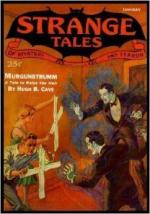|
This section contains 155 words (approx. 1 page at 300 words per page) |

|
The mentioning of pagan religious rites and human sacrifice in "The Thing That Walked on the Wind" may be bothersome to some, although such matters are a routine part of the tradition of supernatural fiction in English.
In"The Thing That Walked on the Wind," these themes heighten the tension of the story by emphasizing a threat posed to people by powerful forces poorly understood by human beings. The story also mentions religious rites, more the product of Derleth's imagination than reality, in parts of the world that seem remote from America. Although these religious practices may be cruel ones, they are shared in the story by the people of Stillwater and by implication other worshipers of elemental beings in North America; their primary purpose in the narrative is to create a background of arcane supernatural intrigue and to symbolically represent the universality of the power...
|
This section contains 155 words (approx. 1 page at 300 words per page) |

|




